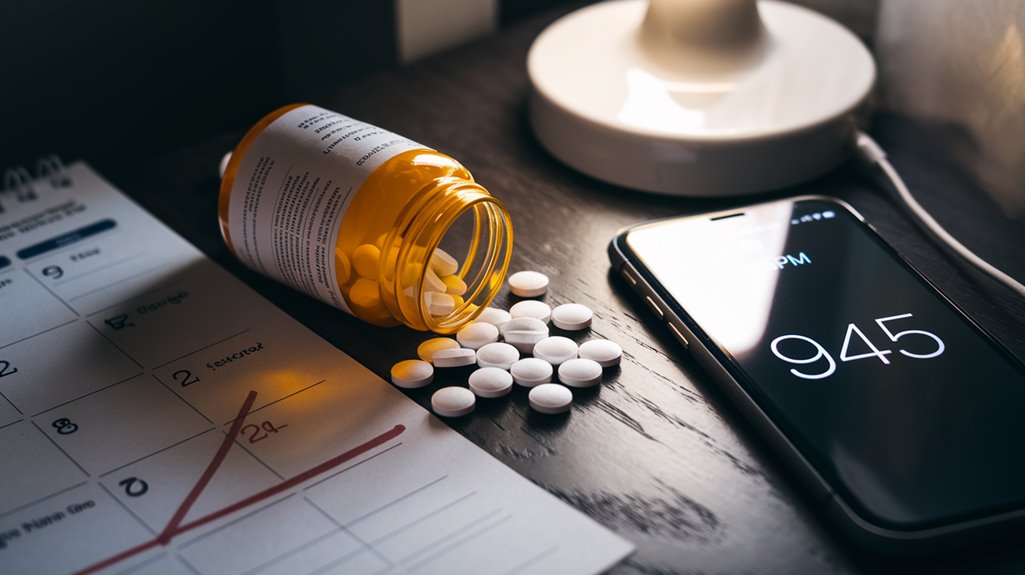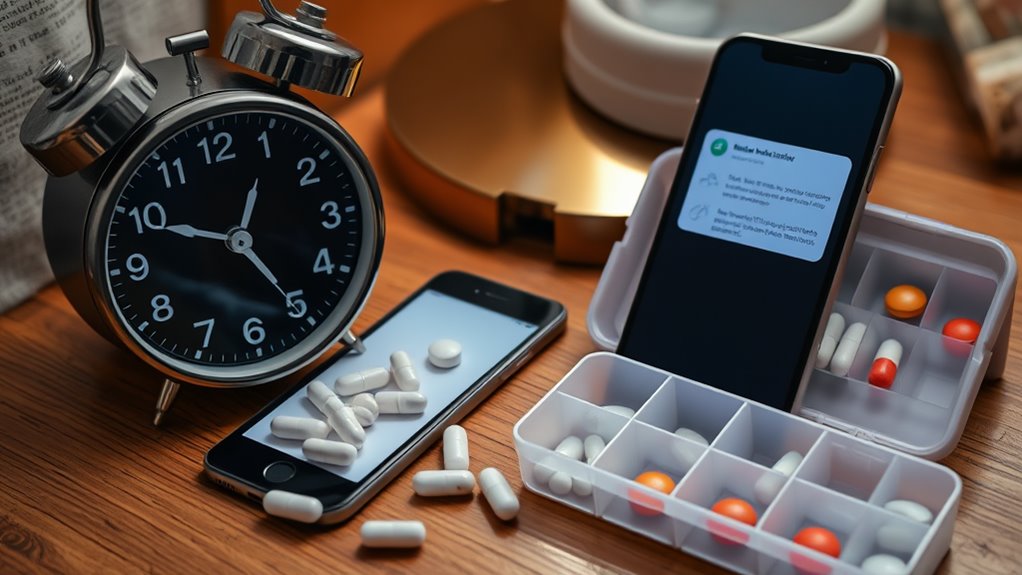Overlooking your medication schedule happens, but knowing exactly when to take or skip that missed dose makes all the difference.

If you miss a medication dose, check how much time has passed since the scheduled dose. For once-daily medications, take the missed dose unless you're close to the next scheduled time. For twice-daily medications, take it if within 6 hours; otherwise, skip it and resume your normal schedule. Never double up on doses unless specifically directed by your healthcare provider. These general guidelines vary by medication type, and understanding your specific medication's protocol is essential for proper management.
When you miss a dose of prescribed medication, you're not just skipping a routine task – you're potentially compromising your health outcomes and treatment effectiveness. Statistics show that medication non-adherence leads to approximately 125,000 deaths annually in the U.S., making it a critical health concern.
Missing your prescribed doses can severely impact chronic conditions like diabetes, asthma, and heart disease. If you've been prescribed anticoagulants, skipping doses increases your risk of dangerous blood clots and strokes. You'll also likely experience longer recovery times from your medical conditions, as interrupting your treatment plan can reverse progress you've made. With 7.7 million Pennsylvanians managing at least one chronic health condition, the scope of potential medication adherence issues is significant.
The consequences are particularly serious when you consider that about 50% of long-term condition medications aren't taken as prescribed. Whether it's a single missed dose or an ongoing pattern, you're putting yourself at risk for complications that your medication was specifically designed to prevent.
When you skip medication doses, you'll face immediate consequences like symptom recurrence and potential adverse reactions that can compromise your health within hours or days. Your long-term treatment success becomes jeopardized as missed doses reduce medication effectiveness and may lead to drug resistance, particularly with antibiotics and antivirals. You'll also risk disease progression and complications that could require additional medical intervention or hospitalization, especially when managing chronic conditions. Many patients miss doses due to simple forgetfulness and confusion about their medication schedules, leading to unintended treatment gaps.
Missing medication doses can trigger immediate and potentially severe health consequences that vary based on the type of medication and your underlying condition.
If you're taking Parkinson's medication, sudden stoppage can lead to Neuroleptic Malignant Syndrome, a potentially fatal reaction. For blood pressure medications, missed doses may increase your stroke risk, while incorrect insulin use can cause dangerous blood sugar fluctuations. With heart medications, you're at risk for cardiac complications, including heart attacks.
You'll likely experience immediate symptoms specific to your condition, such as pain flare-ups or asthma symptoms. Some medications, particularly antidepressants, can cause withdrawal effects when doses are missed. With antibiotics or HIV medications, skipped doses may lead to drug resistance, making your treatment less effective over time. It's crucial to never double dose to make up for missed medication unless specifically instructed by your healthcare provider.
Consistent medication adherence plays an essential role in your long-term health outcomes. When you skip doses or don't complete treatment courses, you'll face increased risks of disease progression, treatment resistance, and severe complications. Missing medications can lead to life-threatening situations, especially for chronic conditions like hypertension or diabetes. Studies show that 125,000 deaths annually result from people not taking their medications as prescribed.
| Impact Area | Risk | Consequence |
|---|---|---|
| Disease Control | Treatment Resistance | Harder-to-treat conditions |
| Health Status | Symptom Management | Worsened disease progression |
| Medication Efficacy | Therapeutic Levels | Reduced treatment effectiveness |
| Economic Impact | Healthcare Costs | Increased hospitalizations |
Your medication's effectiveness depends on maintaining proper therapeutic levels in your body. When you don't follow prescribed schedules, you'll compromise the medication's ability to work correctly, potentially requiring more aggressive treatments or extended therapy courses.
When you realize you've missed a medication dose, first check how much time has passed since your scheduled dosing time. You'll need to determine if it's closer to your next scheduled dose or if only a few hours have elapsed since the missed dose. If you're uncertain about the appropriate action or if the medication requires special handling, contact your healthcare provider or pharmacist immediately for guidance. For most medications, if you remember within a few hours late, you can still take the missed dose and continue with your normal schedule.
Time plays an essential role in determining how to handle a missed medication dose. Before taking any action, you'll need to check how long it's been since you missed the dose and when your next scheduled dose is due.
If you're taking medication once daily, you can usually take the missed dose when you remember it, unless you're close to your next scheduled dose. For twice-daily medications, take the missed dose if it's within 6 hours of the scheduled time; otherwise, skip it. If you're less than 2 hours late, take your dose immediately. However, if you're more than 2 hours late and take the medication more than twice daily, skip the missed dose and continue with your next scheduled one. Never double up doses unless specifically instructed by your healthcare provider. Using an automatic pill dispenser can significantly reduce the chances of missing doses and help maintain proper medication schedules.
Certain situations require immediate consultation with your healthcare provider after missing a dose. You should contact them if you've missed several doses, especially for medications that require consistent blood levels. For life-threatening conditions, don't wait – seek immediate medical guidance. Early intervention is crucial as missed blood pressure medications can lead to serious complications like heart attacks or strokes.
If you're frequently missing doses or unsure about what action to take, reach out to your healthcare provider. They'll assess your situation and may adjust your dosage or prescribe alternative medications that better fit your schedule. They can also help determine if your current treatment remains effective despite missed doses.
Don't hesitate to seek professional advice if you're concerned about medication side effects or efficacy. Your healthcare provider can offer personalized guidance based on your specific medication and medical history.
Missing multiple doses or feeling uncertain about medication instructions signals the need to contact your healthcare provider promptly. You'll need immediate medical guidance if you've missed two or more consecutive doses or if your symptoms worsen after missing a dose. This is especially vital for critical medications like anticoagulants. Regular follow-up appointments help ensure proper medication management and dosing schedules.
| Situation | Action Required | Time Frame |
|---|---|---|
| Multiple Missed Doses | Contact Provider | Immediately |
| Unclear Instructions | Seek Clarification | Same Day |
| Worsening Symptoms | Medical Consultation | Right Away |
When managing missed doses, don't double up to catch up unless specifically directed by your provider. Document any missed doses and actions taken to maintain accurate records. If you're taking multiple medications daily, use pill organizers and set reminders to prevent missing doses. For complex medication regimens, contact your healthcare provider to understand potential interactions and develop a clear plan for handling missed doses.

You'll need to handle missed doses differently based on whether your medication is time-sensitive, such as insulin or birth control pills. For medications taken daily, you can often take the missed dose when you remember it, while weekly medications may require specific timing adjustments according to your prescription schedule. Your healthcare provider should give you specific instructions for your time-sensitive medications, as these often have stricter requirements for managing missed doses. For optimal safety and effectiveness, read the medication label carefully to understand the specific guidelines for your prescription.
While many medications allow for some flexibility in timing, time-critical medicines require strict adherence to scheduled dosing to maintain therapeutic effectiveness and prevent adverse effects. You'll need to follow specific guidelines for handling missed doses based on your medication's requirements and dosing frequency.
For GLP-1 medications, missing doses for two or more weeks may require restarting at a lower dosage to avoid side effects.
Understanding the differences between daily and weekly dosing schedules is essential for ideal medication effectiveness and adherence. Research shows that you're more likely to stick to weekly dosing regimens compared to daily ones, particularly if you're treating conditions like osteoporosis. Studies demonstrate that weekly dosing regimens achieve a 63.5% adherence rate.
If you're over 65, you'll need to pay special attention to your dosing schedule, as adherence differences become more significant in older age groups. While daily dosing is necessary for medications like blood pressure treatments and antibiotics, missing these doses can reduce their effectiveness and cause symptoms to return. For medications available in both daily and weekly options, discuss with your healthcare provider which schedule might work better for you, as consistency in taking your medication is vital for successful treatment outcomes.
When facing a missed medication dose, several emergency resources and support systems are available to help you manage the situation effectively. The Emergency Prescription Assistance Program (EPAP) provides vital support in federally declared disaster areas, offering free 30-day supplies of medications for those without insurance.
For immediate guidance on missed doses, you'll find these essential support options:
If you're unsure about taking a missed dose, don't hesitate to contact your healthcare provider or pharmacist. Remember, the consequences of missed doses can be serious, potentially leading to treatment failures or health complications.

Modern technology offers powerful solutions to prevent and manage missed medication doses. You'll find various digital tools designed to keep you on track with your medication schedule. Smart pill bottles can alert you through light and sound signals, while medication reminder apps provide personalized notifications on your smartphone.
For extensive medication management, you can utilize electronic Medication Administration Record (eMAR) systems like Birdie or Nourish Care. These platforms let you access your medication schedules, track adherence, and record each dose you take. If you're working with healthcare providers, they can use systems like WellSky to monitor your medication profile and identify potential safety concerns. The system's patient-centric profiles provide comprehensive views of your medication history and potential interactions.
AI-powered platforms can predict if you're at risk for non-adherence and tailor support accordingly. You can also opt for automated text messages or IVR reminders to help maintain your medication routine. Many systems now include home delivery options to guarantee you never run out of medications.
Following a consistent medication schedule forms the foundation of effective treatment adherence. You'll need to establish specific dosing times that align with your daily routine and maintain detailed records of your medication regimen. This includes documenting start and stop dates, as well as any changes in dosing instructions from your healthcare provider. Research shows that medication adherence rates typically hover around 50% for prescribed medications.
To maintain an effective medication schedule:
Remember to update your medication records whenever there's a change in your prescription. If you're struggling with adherence, work with your healthcare team to adjust your schedule or explore additional support options.

Certain medications demand heightened vigilance due to their narrow therapeutic windows and potential health impacts when doses are missed. Medications like warfarin, lithium, and phenytoin require strict adherence to dosing schedules to maintain therapeutic levels and prevent complications. Regular medication supply helps ensure continuous treatment without disruption.
You'll need to be especially careful with medications for chronic conditions such as diabetes, hypertension, and asthma. Missing doses can quickly lead to symptom flare-ups and condition deterioration. For antibiotics and anti-infectives, skipping doses can compromise treatment effectiveness and potentially lead to drug resistance.
If you're taking medications for neurological or psychiatric conditions, missed doses can result in serious consequences like seizures or mental health instability. You should immediately consult your healthcare provider if you miss a dose of these critical medications. Don't attempt to double up or adjust dosing without professional guidance, as this could lead to adverse effects or treatment failure.
A reliable medication routine forms the cornerstone of successful treatment adherence and therapeutic outcomes. To build an effective system, you'll need to combine organizational tools with consistent daily practices. Start by creating a detailed schedule that accounts for each medication's specific timing requirements and potential interactions. Research shows that poor medication adherence affects approximately 50% of patients, leading to treatment failures and complications. You'll also want to leverage modern technology and traditional tools to maintain your regimen.
Remember to regularly consult your healthcare provider about optimizing your routine and addressing any challenges that arise.

When dealing with missed doses, your healthcare team serves as the primary resource for guidance and support. They'll provide specific instructions tailored to your medication and circumstances, ensuring you understand how to handle missed doses safely and effectively.
| Team Member | Role | How They Help |
|---|---|---|
| Doctor | Primary Care | Develops medication plan, provides specific guidance |
| Pharmacist | Medication Expert | Offers advice on timing, interactions, alternatives |
| Nurse | Care Coordinator | Assists with education, monitoring, support |
Don't hesitate to contact your healthcare providers if you're uncertain about what to do after missing a dose. They can assess potential risks and recommend appropriate actions based on your specific medication. During appointments, discuss any challenges you're facing with your medication schedule. Your healthcare team can suggest alternative formulations, recommend support systems like medication reminders, or adjust your regimen to better suit your lifestyle. Regular medication reviews with your team help prevent and address issues related to missed doses.
Recognizing signs of a missed dose requires careful attention to changes in your physical symptoms and overall well-being. If you're on regular medication, being aware of these indicators can help you identify when you've missed a dose and take appropriate action.
Your body may signal a missed dose through various symptoms, particularly if you're taking medications for chronic conditions. These signs can vary depending on the type of medication you're using. Studies show that forgetfulness rates highest among reasons patients miss their prescribed doses.
Pay special attention to any return or worsening of the symptoms your medication is meant to control.

The creation of a personal medication action plan serves as your essential roadmap for managing prescribed treatments effectively. Work with your healthcare provider to document current medications, allergies, and medical history while establishing clear protocols for missed doses and potential side effects. Better health outcomes are achieved through consistent adherence to a structured medication plan.
| Action Step | Implementation |
|---|---|
| Information Gathering | List all medications, doses, and schedules |
| Provider Consultation | Schedule review with doctor to confirm plan |
| Monitoring System | Set up tracking method and reminders |
Develop your plan by incorporating specific instructions from your healthcare provider, including emergency contacts and steps for handling adverse reactions. You'll need to regularly update this document as medications or dosages change. Consider using organizational tools like pillboxes or digital reminders to maintain consistency. Remember to keep your plan accessible and share it with family members or caregivers who might assist with medication management.
If you've missed a medication dose, it's essential to follow your healthcare provider's specific instructions and your medication guide. Studies show that approximately 50% of patients don't take their medications as prescribed, leading to potential health complications. You'll need to establish a consistent routine, use reminder tools, and maintain open communication with your healthcare team to prevent missed doses and guarantee optimal treatment outcomes.